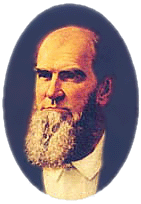|
|
Richard Coke (1829-1897), Texas governor and United States senator, son of John and Eliza (Hankins) Coke, was born near Williamsburg, Virginia, on March 13, 1829. He entered William and Mary College in 1843 and in July 1848 was awarded a diploma in civil law. In 1850 he moved to Waco, then only a shantytown on the Texas frontier, where he soon earned a reputation as an able lawyer in both civil and criminal cases. In 1852 he married Mary Evans Horne of Waco, who was only fifteen years old. They had two daughters who died in infancy, and two sons, both of whom died before the age of thirty. In 1859 Coke was appointed by Gov. Hardin R. Runnels to a commission that decided that Comanche Indians on the Brazos Indian Reservation should be removed from Texas. In 1861 Coke was a delegate to the Secession Convention in Austin and voted for secession. The next year he raised a company that became part of Joseph W. Speight's Fifteenth Texas Infantry and, as captain, served throughout the Civil War, except for a sixty-day leave in 1864. He was wounded at Bayou Bourbeau (Muddy Creek), near Opelousas, Louisiana, on November 3, 1863. In September 1865 he was appointed judge of the Nineteenth Judicial District by Gov. A. J. Hamilton, who valued Coke's integrity in spite of their political differences. Coke was elected associate justice of the state Supreme Court in 1866 but was removed a year later by Philip Henry Sheridan, the military commander. Coke won the Democratic nomination for governor in 1873 and, in a bitter and sometimes violent election, defeated Governor Edmund J. Davis, the Republican candidate, by a vote of 85,549 to 42,663. He took office in January 1874 in spite of Davis's resistance and an attempt of the Texas Supreme Court to nullify the election by its decision in the case Ex parte Rodríguez. Governor Coke tried to restore financial order by cutting expenditures for public printing and the state asylums, but the cost of securing the safety of the Mexican border and combatting Comanche and Kiowa Indians on the western frontier offset such reductions. On one occasion he ignored threats of physical violence when he vetoed a popular bill for a subsidy to the International-Great Northern Railroad. The new governor was burdened with job applications, pleas for pardons, and requests for six-gun permits and for reward money to aid in the capture of criminals. Under the Constitution of 1876, adopted during his term, Coke served on a three-member board that supervised a new, decentralized system of public education. Vocational education benefited from the opening of the Agricultural and Mechanical College of Texas (now Texas A&M University), at which Coke made an eloquent speech. He was reelected governor by a ratio of three to one over William Morton Chambers, the Republican candidate. He was elected to the United States Senate in May 1876 and resigned the governorship in December. He began his first term as senator on March 4, 1877, replacing Morgan C. Hamilton. Coke was generally regarded as an able and well-informed member of the Senate. "Old Brains," as his admirers called him, supported the Bland-Allison Act of 1878 and the Interstate Commerce Act of 1887. On grounds of unconstitutionality and extravagance, he opposed the Blair Bill for federal aid to the common schools. He also opposed the protective tariff, the suspension of silver coinage, and the Force Bill, which would have provided federal protection for voters and elections threatened by intimidation and violence. Meanwhile, Coke continued his involvement in Texas politics. He spoke as a strong opponent of prohibition throughout the state. In 1892 he traveled home to support the reelection of Gov. James S. Hogg over George Clark of Waco, Coke's former friend and campaign manager. Coke was reelected to the Senate in January 1883 and again in January 1889, both times by unanimous vote in the legislature. In 1894 he announced that he would not seek another term. In the spring of 1897 he suffered from exposure while caring for his flooded Brazos valley farm and was ill for three weeks. He died at his home in Waco on May 14. After a state funeral, he was buried in Oakwood Cemetery, Waco. Information about Coke's religion is scanty; he was probably raised as an Episcopalian but in later years attended the Baptist Church. A white-bearded, hulking figure who towered six feet, three inches and weighed 240 pounds, Coke was a commanding presence. It is said that on the political platform he could bellow "like a prairie bull." His Senate speeches, while often ponderous, were factual, well-organized, and persuasive. He is considered one of the important leaders in Texas in the late nineteenth century. BIBLIOGRAPHY: Merle Mears Duncan, "The Death of Senator Coke," Southwestern Historical Quarterly 63 (January 1960). Governors' Messages: Coke to Ross (Inclusive), 1874-1891 (Austin: Archives and History Department, Texas State Library, 1916). Norman Kittrell, Governors Who Have Been and Other Public Men of Texas (Houston: Dealy-Adey-Elgin, 1921). Vertical Files, Barker Texas History Center, University of Texas at Austin. John W. Payne, Jr. Reprinted with permission from the Handbook of Texas Online, a joint project of the Texas State Historical Association and the General Libraries at the University of Texas at Austin. © 2003, The Texas State Historical Association.
|
